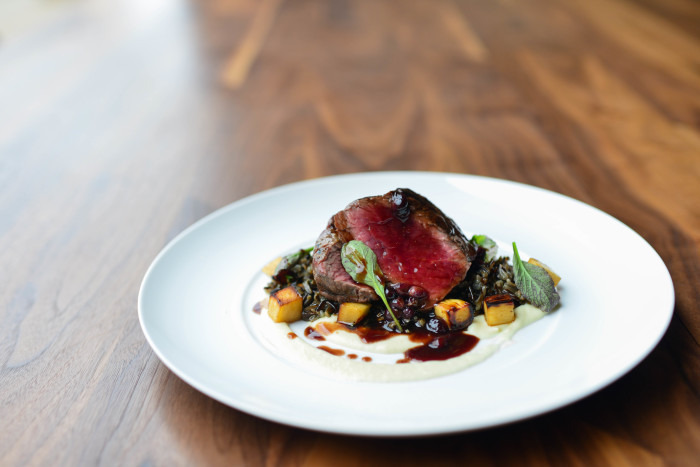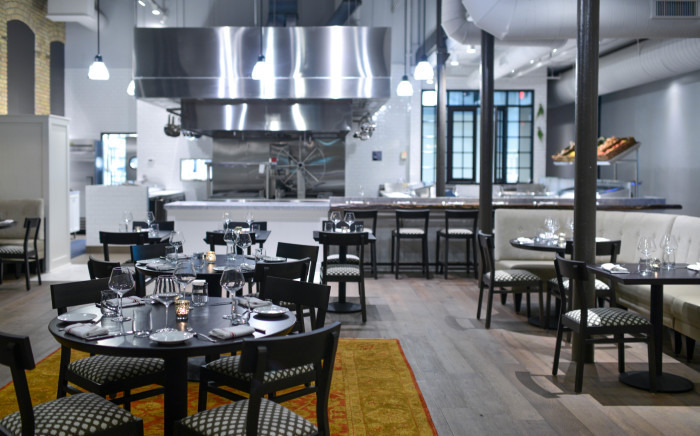Spoon And Stable's Gavin Kaysen Says Minneapolis Diners Are Just Like New Yorkers
Chef Gavin Kaysen made national waves last year when he announced he was giving up the helm of New York City's Café Boulud to open a restaurant in his hometown. Kaysen, who worked for Daniel Boulud for nine years and counts the great chef as his mentor, rolled out Spoon and Stable in the North Loop neighborhood of Minneapolis in November last year and has had lines out the door ever since, not to mention a James Beard Award nomination for 2015's Best New Restaurant.
Of his New American menu, the chef says, "The idea is not to serve groundbreaking food. We don't want people to think they can only eat here on special occasions." The lineup changes monthly but retains certain dishes, like scallop crudo and bison tartare, while adjusting to seasonal ingredients. Kaysen also throws in some Minnesota touches, like the tartare (which is dressed in harissa aioli and served with chickpea-based socca chips) and a dish I can't stop thinking about: lightly breaded cheese curds served atop the creamiest spinach.
The corner space was originally a 1906 stable, which contributes to half of the name. The other half comes from what Kaysen calls his "well-documented problem of taking spoons from around the world," the spoils of which are now displayed on a wooden board fashioned by his brother and hung on a wall. The white-painted dining room has double-high ceilings and an airy vibe belied by the modest entrance. "I loved how small the facade was," Kaysen says. "It made you think none of this would be inside. It gave me an opportunity to reset or recalibrate what a guest was thinking." Read on for what the chef misses (and doesn't miss) about New York and what he discusses on the phone every week with Boulud.
I'm curious: How are Minneapolis diners different from New York diners?
I don't see a ton of difference. Everybody is pretty well traveled. The great part about being in the middle of the country is it's easy to get everywhere, especially in our country. It's two and a half hours to San Francisco, and it's two and a half hours to New York. They eat early here — and they eat late. Yesterday was Wednesday, and we had 10 p.m. reservations. I left at 11 p.m., and they were still putting food on.
Of course, you're asking someone who worked on the Upper East Side of New York, so it's different. For example, one of the first recommendations I received from a guest is that I could cook with more pork. When I worked at Café Boulud, we had a lot of Jewish clientele, so I couldn't.
By natural instinct, Minnesotans are passive-aggressive. But I don't see much of a difference. I walked around my dining room in New York City, and I walk around here. They'll tell me, "I liked this" and "I didn't like this." I also cook for a lot of New Yorkers here.
Has Daniel Boulud been here?
He's a business partner; he's one of our investors. He came in the first night for our opening party. So he was here. It was a lot of fun. We ended up staying in this room until 3 o'clock in the morning drinking wine.
What did he say about Spoon and Stable?
He was very proud. I usually talk to him once a week. We try to connect every Sunday. He's such an important mentor who helped me establish not only how I cook, but also how I manage and inspire and motivate. And to learn how to pull back and trust people. He has 17 restaurants, so he really has to put a lot of trust in people. He does that correctly and has set the standard for me.
I made a very conscious decision to leave New York City and move home. And it probably took me two or three years to come to that decision. Daniel was with me every step. I never would have left him if I didn't have a succession plan.
What do you guys talk about on the phone?
Sometimes just life and how's his family, how's my family. He tells me about his little boy, Julien, who just learned how to walk. Then we talk about the restaurant. About the cooks, how they're developing and shaping. And do I have any cooks to send to New York yet? [Laughs.]
Do you feel his influence here?
Not directly, but I feel his influence in how I am every day. Certainly his spontaneity and his generosity and hospitality was something I learned at an early age from him. He taught me so much about cooking, but also how to take care of people in the true sense of hospitality. Not just the people eating, but the people who cook for them and serve them.
You talked about being surprised people were eating later. Anything else that has surprised you here?
People standing in line in the middle of winter. Now we open at 4, but we used to open at 5, and every day at 4:45, we would see a line form. The longest I ever saw was 76 people.
I read in an interview from the time you were opening that you were worried about the winter. How did that go?
In New York, if it rains or snows, everyone stays home. But here people are better equipped. We had a very busy winter. And we've had a busy summer, which has also surprised me. In New York, we'd be busy during the week in summer and then dead on weekends. Here, everyone goes to the cabin. Some of the people that live around here — it's a hard reservation to get, but they've eaten here 20 times. We book our reservations 60 days in advance. So I think it's booked through September. That's for prime time; we still have 9 o'clocks.

Has it been weird for you to see the dining scene explode in Minneapolis?
Yeah. I feel like I've moved to a new city. For me, I think my timing was good. So many restaurants have opened in the last six months. My hope and my dream is to get more purveyors to open here. Summer is good, but winter is not great. I'd like to see more produce purveyors. People who can fly in fruit and vegetables from around the country. And more seafood purveyors. The meat here is great.
The farmers are incredible. These guys come out of nowhere, and they bring you the best chanterelle mushrooms you've ever seen in your life. During the summer, our pig farmer, Pork and Plants, has a vegetable garden, and we get the most amazing tomatoes from them. That's what keeps all of us inspired.
What do you think accounts for Minneapolis's emerging food scene?
I think some of it is the chefs who've been at a forefront. That's really helpful to someone like me. I think the clientele have helped shape that, too. They're the ones that demand the product.
There's also a growing tech scene here. You can go to a meeting in New York and be back in time for dinner.
Speaking of New York, what do you miss?
I miss the pockets of the neighborhoods. I like being in North Loop because it's not a complete neighborhood yet, but it's the closest thing I've seen in Minneapolis. I didn't drive a car for nine years when I lived [in New York]. I liked that. But I live in Edina now, so it's ten minutes down the road.
What do you not miss about New York?
I don't miss the smell of dog piss that's probably really bad right now. I don't miss always having to run. Even if you can relax, you don't feel like you can relax. I like being able to leave my restaurant after doing 250 covers and drive home with the music on knowing I can get home and sit out on my porch and it's quiet.
When we first moved here, the first two months I thought our house was being robbed — it was so quiet! But now it's beautiful. We have this beautiful porch that's screened in. We have these beautiful cottonwood trees, and they make this very meditative sound when the wind hits them. It's good to be home.
I'll always miss new York. It's the best city in the world as far as I'm concerned. I love going back there. I love the energy; I love the culture. I love the drive to always be better. I love all the pockets of that city. But sometimes I think it takes leaving that environment to remember why it's so special.

What's coming up for you next at Spoon and Stable?
We're looking forward to the one-year anniversary. And we're going to take a little hiatus at the end of August: Everyone's going to get a vacation. It's the week of the state fair, which is a really big deal. It's also the week of Labor Day, and it's the same week that the kids go back to school.
We're thinking about what we want to do next. I think the most important thing is to be patient and to take it slow and not rush into it. There have been a lot of restaurants that have opened, like I mentioned, so we want to let the dust settle and see what makes sense. We have a very talented pastry chef, Diane Yang, so it would be great to do something with her in the future.
To me, generationally, Daniel and Thomas [Keller]'s generation built empires that allowed us to work throughout the world. That's been an exceptional thing for our industry. I think it's my generation's opportunity, or responsibility, to train the new generation. I think a lot of us moving back home and investing our knowledge into these markets has been really important.
Great point. It does seem like the food scene's direction has shifted from a focus on global cities to a focus on smaller regional markets.
Yeah, to me it's a very European concept. If you go to France, some of the best food you have is two hours outside Paris or an hour outside of Lyon. We in the U.S. never really had that. It was always on the coasts. And then Chicago got really big and very sophisticated in dining. And I think even though they're a large city, they helped create the small-city boom. People thought, If they can do it in Chicago, I can do it in Nashville or Portland or Seattle or Austin.
If you look at the chefs getting the attention or press or accolades, they're typically chefs who have worked for one of the bigger chefs. That's why I truly believe it's our generation's responsibility to train the next generation of chefs and to create that family tree. It's not me who's going to be opening those restaurants. The people in there every day are hopefully the great people I'm training.
There are 82 people who work in this restaurant. That's 82 families that rely on us to be busy to be healthy. That's 82 families that rely on a paycheck that comes biweekly and on time. That's 82 families that trust me. That's pretty big. That inspires me — a lot.

